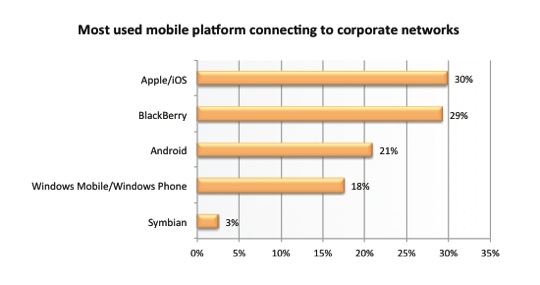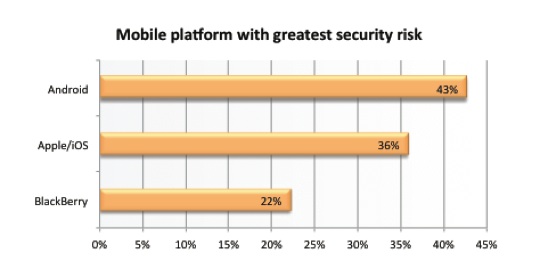 Check Point Software has released the results of a survey they conducted on mobile platform proliferation in the corporate world today. The study tries to identify which platforms are dominating corporate networks, and which are lagging behind. Obviously Symbian is at the bottom of the list, but the company at the top may be surprising to some, especially those baby-boomer IT professionals who have a death grip on their BlackBerrys.
Check Point Software has released the results of a survey they conducted on mobile platform proliferation in the corporate world today. The study tries to identify which platforms are dominating corporate networks, and which are lagging behind. Obviously Symbian is at the bottom of the list, but the company at the top may be surprising to some, especially those baby-boomer IT professionals who have a death grip on their BlackBerrys.
The Check Point Software study indicates:
Participants reported that Apple iOS (30%) and BlackBerry (29%) were the most commonly used mobile device types connecting to their corporate networks followed by Android (21%).
We’d be lying if we said we weren’t surprised that Apple has managed to completely pass RIM in the corporate world so quickly. Obviously the reasons for that are open to debate. We’ll leave you to reach your own conclusions.
What’s even more surprising from the study is that Check Point Software found that Android is the most risky platform on corporate networks:
Participants were asked which of the most common mobile platforms they viewed as being the greatest security risk. Among the IT professionals in this study, Android was named as the greatest risk (43%). And, BlackBerry was the operating system that was perceived as having a lower potential for problems than other mobile platforms with only 22% ranking it as the platform with the greatest security risk.
What’s not surprising is that the study also found that uniformed and under-trained users were the biggest threats to the corporate network. That’s nothing new. It’s been like this since the beginning of corporate networks.
It was about this time last year when every single know-it-all pundit, wannabe pundit, and IT professional on the planet was pumping their collective fists in the air because RIM was about to release a tablet that would absolutely annihilate the iPad. Today’s probably a good day to think about that for a second, and reiterate that the majority of those stodgy baby boomer IT-types really have no clue what they’re talking about these days. Now, more than ever, employees are driving the decisions in IT departments. I think these findings really hammer that point home. Today’s IT department is a bottom up working group, not a top down approach where IT managers call the shots.
Source: Check Point Software








